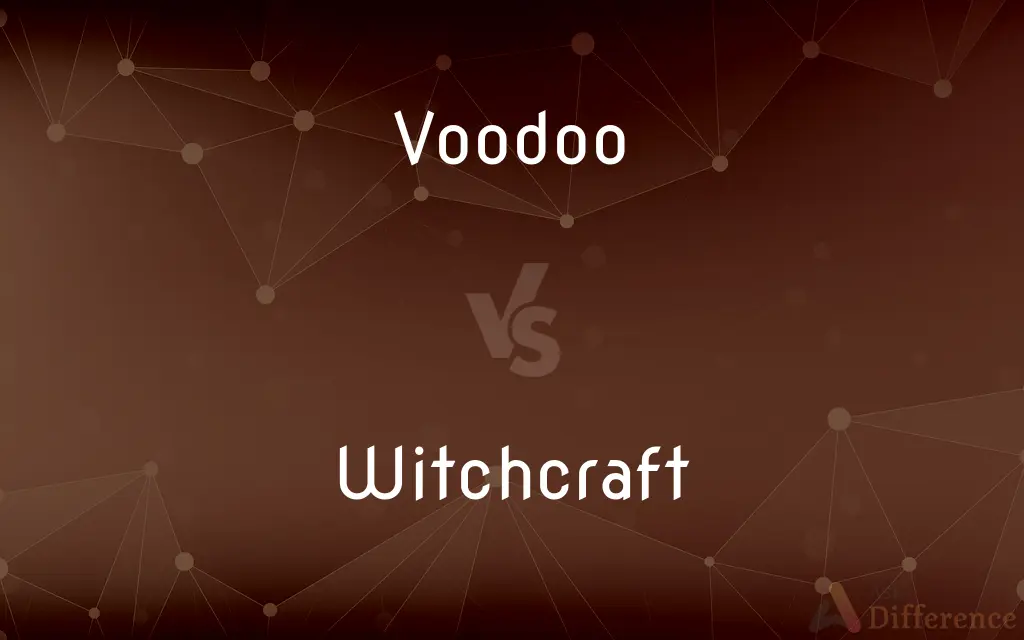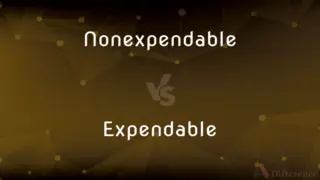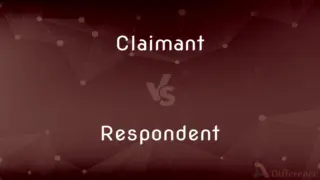Voodoo vs. Witchcraft — What's the Difference?

Difference Between Voodoo and Witchcraft
ADVERTISEMENT
Compare with Definitions
Voodoo
A black religious cult practised in the Caribbean and the southern US, combining elements of Roman Catholic ritual with traditional African magical and religious rites, and characterized by sorcery and spirit possession
If you understand voodoo you can talk to these spirits
A voodoo priest
They can use voodoo to help people
A voodoo doll
Witchcraft
Witchcraft is the practice of what the practitioner ("witch") believes to be supernatural skills and abilities, such as the casting of spells and the performance of magical rituals. Witchcraft is a broad term that varies culturally and societally, and thus can be difficult to define with precision.
Voodoo
Affect (someone) by the practice of voodoo
Someone had voodooed her
Witchcraft
Magic; sorcery.
Voodoo
A religion of West African origin practiced chiefly in Haiti and other Caribbean countries, based on animism, magic, and elements of Roman Catholic ritual, and characterized by belief in a supreme God and a large pantheon of local and tutelary deities, deified ancestors, and saints, who communicate with believers in dreams, trances, and ritual possessions. Also called vodoun.
ADVERTISEMENT
Witchcraft
Wicca.
Voodoo
A practitioner, priest, or priestess of voodoo.
Witchcraft
A magical or irresistible influence, attraction, or charm.
Voodoo
Deceptive or delusive nonsense.
Witchcraft
The practice of witches; magic, sorcery, or the use of supernatural powers to influence or predict events.
Wiccans believe in a modernised form of witchcraft.
Voodoo
To place under the influence of a spell or curse; bewitch.
Witchcraft
Something, such as an advanced technology, that seems almost magical.
Voodoo
Of or relating to the beliefs or practices of voodoo.
Witchcraft
The practices or art of witches.
Voodoo
Based on unrealistic or delusive assumptions
Voodoo economics.
Witchcraft
Sorcery; enchantments; intercourse with evil spirits.
Voodoo
Any of a group of related religious practices found chiefly in and around the Caribbean, particularly in Haiti and Louisiana.
Witchcraft
Power more than natural; irresistible influence.
He hath a witchcraftOver the king in 's tongue.
Voodoo
The spiritual beliefs of the Ewe/Fon of West Africa, practiced chiefly in Benin and in the south of Togo.
Witchcraft
Adherence to or the practice of Wicca. In this sense the term does not necessarily include attempts at practice of magic, other than by prayers to the deities.
Voodoo
(pejorative) Any sort of magical or irrational approach to a problem.
I want a real explanation, not this statistical voodoo.
Witchcraft
The art of sorcery
Voodoo
(dated) One who practices voodoo; a native sorcerer.
Voodoo
To bewitch someone or something using voodoo
He claimed his neighbor had voodooed him.
Voodoo
See Voodooism.
Voodoo
One who practices voodooism; a negro sorcerer.
Voodoo
Of or pertaining to voodooism, or a voodoo; as, voodoo incantations.
Voodoo
A charm superstitiously believed to embody magical powers
Voodoo
A religious cult practiced chiefly in Caribbean countries (especially Haiti); involves witchcraft and animistic deities
Voodoo
Bewitch by or as if by a voodoo
Share Your Discovery

Previous Comparison
Nonexpendable vs. Expendable
Next Comparison
Claimant vs. Respondent













































